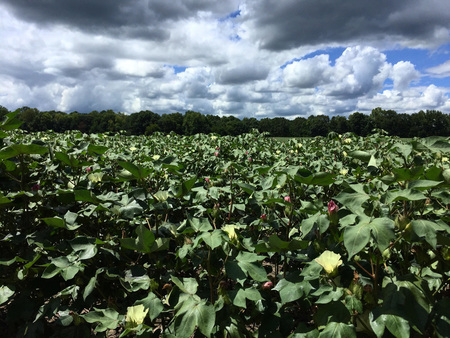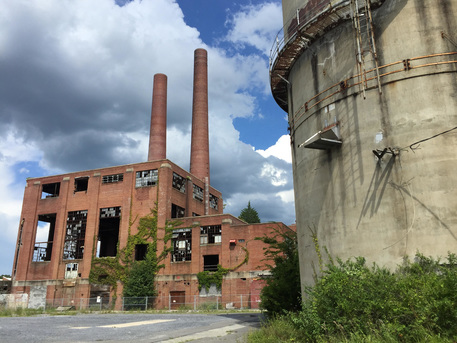|
By Sam Burnham @C_SamBurnham  Georgia's Cotton Production is Perennially Near the Top in the Nation Georgia's Cotton Production is Perennially Near the Top in the Nation I talk about a lot about soil, nature, rivers, not the typical topics you tend to find from a more conservative writer. I wasn't always as interested in those things. Honestly, yes I was but I never really made them an issue because, as I just said, they're not the typical topics of a conservative. I grew up following Republican politics. I saw the economy as something that should take precedent over environmental causes. But a few things happened as I grew older. I remember riding past a local landfill with a mentor that I only refer to here as "The Sage". He pointed out the truck window at the treeline that hides the refuse from the paved road and said "I used to hunt all that property." Then I thought about that property being a big pile of garbage. More recently, my wife and I were driving down I-75 in Cobb County and saw the big concrete thing that is being built alongside the highway. Part exit ramp, part Lake Pontchartrain Causeway, all eyesore, I gazed upon it and thought out loud "What are we doing to Georgia?" She agreed with the sentiment. But then think about it this way. According to the Georgia Farm Bureau, agriculture is our top industry, contributing $74.35 billion to the state economy annually. One in seven Georgians work in agriculture, forestry, or related fields. in 2012 there were 42,257 farms in the state. The GFB website states "Georgia is perennially the number one state in the nation in the production of peanuts, broilers (chickens), pecans, rye, and spring onions." They then list 11 more crops of which we perennially produce near the top in the nation. That makes the environment an economic issue. For every building, bank, overpass, stadium, and train in Atlanta, the largest contributor to this state's GDP is found in the fields, orchards, and poultry houses in the rural counties. The area inside I-285 contributes little to our largest industry. But that area pollutes the air, sucks up the water, causes soil runoff...basically destroys almost every resource that our primary industry requires. That is a problem. Add to that how much garbage they create that no longer can be stored in their full landfills and is shipped by waste companies to landfills in South Georgia and destroy acres that could be used for peanuts, peaches, pecans, watermelons...you get the picture. Then consider that this section of the state receives the bulk of the tax dollars while the parts of the state responsible for our top industry get...our research is inconclusive on what they get. But it ain't much. Long story short, our perceived economic powerhouse is actually making it harder for our top industry to be successful. All of that brings me to this thought. From Wendell Berry's 2012 Jefferson Lecture for The National Endowment for the Humanities I share this quote: "Corporate industrialism itself has exposed the falsehood that it ever was inevitable or that it ever has given precedence to the common good. It has failed to sustain the health and stability of human society. Among its characteristic signs are destroyed communities, neighborhoods, families, small businesses, and small farms. It has failed just as conspicuously and more dangerously to conserve the wealth and health of nature."  When Industry Moves Away Only Rubble Remains When Industry Moves Away Only Rubble Remains In far too many places in this state, and throughout The South, there's an empty factory. A place that may have paid a decent wage, maybe build the makings of a community, provided a good product to customers. But now it's barren. It might be an empty shell of a building. Might be an empty lot that isn't fit for much. It might be a contaminated brownfield that no one even wants to walk across. This is not a post to demonize individual businesses. It's to make a point. Businesses, especially big ones, come and go. They sprawl out across the soil and do well among us. Until some other town offers them a tax deferral or some new treaty makes relocating to another country profitable. But Agriculture was our top industry in 1735. And the occupants of what is now Georgia were raising the "three sisters" - corn, squash, and beans - a thousand years ago. We have soil, water, air, and sunshine. If every heavy industry in this state closed tomorrow, one in seven Georgians would never miss a day of work. Polluted air, water, and soil could end up costing us over $74 billion a year. We need to consider our economy. I know we need commerce and industry. Agriculture alone is not the answer. But we also need to remember which side our bread is buttered on and protect the resources that our economic engine needs. In the coming weeks, there will likely be a few more environmental posts. There's an announcement coming soon about that. Until next time...
0 Comments
Leave a Reply. |
Sam B.Historian, self-proclaimed gentleman, agrarian-at-heart, & curator extraordinaire Social MediaCategories
All
Archives
November 2022
|




 RSS Feed
RSS Feed
